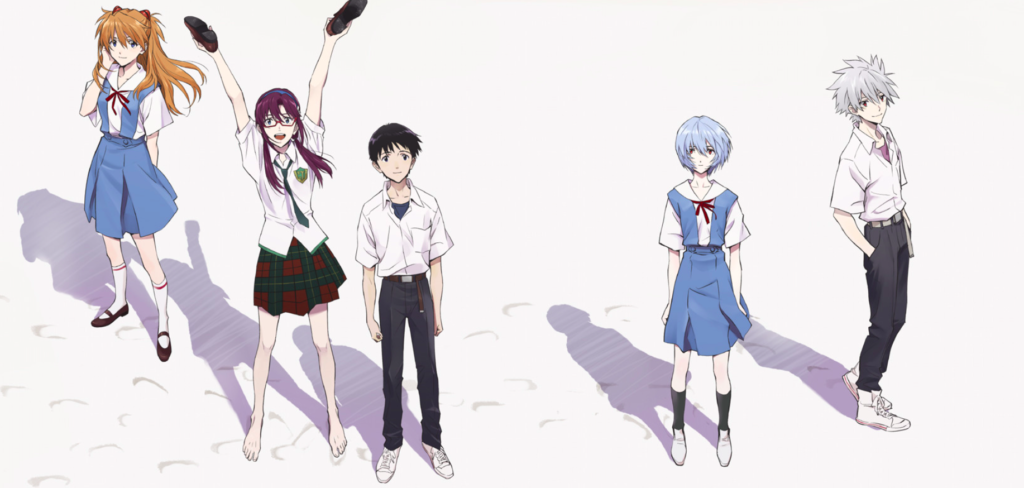
Evangelion: 3.0+1.0 Thrice Upon a Time is both an ending and a beginning
WILLE and NERV are fighting in core-ified Paris, France. WILLE’s Eva uses the Eiffel Tower as a weapon, and NERV has a conga line of Eva legs prepping a devastating blast to WILLE’s HQ. As for me, my eyes are left wide from being immediately stimulated by the amount of animation happening on screen. Evangelion: 3.0+1.0 Thrice Upon a Time, also called Shin Evangelion, starts off with a literal loud bang. The famous anime series’ last chapter, with over half a million tickets sold on its first day during the theatrical release in Japan, has fans wondering what this ending could mean for Shinji, Asuka, Rei, and the rest of the NGE gang.
Neon Genesis Evangelion was released as a manga in 1994, with a 26 episode TV series adaptation from 1995-1996. Gathering fame from its religious symbolism, depiction of depression, and the mental toll of constant impending doom and it’s affect on the characters, the Death and Rebirth, and End of Evangelion movies followed quickly after, offering an ending with more closure than the last two episodes of the TV series. A few years later, Neon Genesis made a comeback with its Rebuild movies, a reiteration of the original series. Starting with 1.0: You Are (Not) Alone, briefly going over what happened in the TV series, then with 2.0: You Can (Not) Advance and 3.0: You Can (Not) Redo, the familiar story of Shinji’s selfish worldview goes in a different direction. Unfortunately for Neon Genesis Evangelion, these movies have seen years of hate from all angles- story change, confusing symbolism, selling out to product placing, etc. So it’s no surprise that the reveal of Evangelion: 3.0+1.0 Thrice Upon a Time (Shin Evangelion), while anticipated by fans, was met with guarded responses about what this movie might bring to the end of an anime that’s touched many lives.
Shin Evangelion starts with a fight between NERV and WILLE in the middle of Paris, with Misato, Ritsuko, and the rest of the WILLE team under extreme distress. While this is going on, you see Shinji, Asuka, and Rei walking through core-ified Japan after their battle in the last movie. There, the anime goes further into what happened during that 14-year gap while Shinji was out. You see familiar faces like Tohji, Hikari, and Kensuke, all taking on occupations that fit their younger selves from when they were classmates with the three pilots. Misato’s attitude change is more explained, we find out what went on with Kaji, and see Gendo’s true fear, and so much more.
With lots of colors flashing, Eva morphings, passionate voice acting, and seeing scenes that act as a love letter to the original series, the Shin Evangelion experience was a fun ride, that even my mom popped in to see what I was watching, and eventually joined me to find out what happened in the end.
Did I like Shin Evangelion? Short easy answer: yes of course! It marks the end of Neon Genesis Evangelion, giving an ending for Shinji that’s happy, and shows viewers that he has grown outside of his tunnel vision view on life from his rotten life experiences.
The long answer is no and yes. While I loved the character development we all see in Shinji, and a satisfying ending where there is a life worth living beyond Angels, Evas, and Impacts; there were still choices that left me raising an eyebrow. Since the original show’s run, we see Gendo as the big bad guy out to end the world to purify it, and so to suddenly give one of the most infamous villains in anime history a redemption arc, where he gets an end he does not deserve, for the sake of mending a broken father and son relationship, I feel is not right. Then there is Rei, whose tragic story, along with the other pilots, is being a predetermined piece of a grand scheme, and is internally fighting her way out of being someone’s doll. She is reduced to being just that in this movie (and throughout all the Rebuild movies, if I’m being honest). Last but not least, I loved the symbolism and how it brought back memories of the original series when Shinji was fighting in an anti-universe, but the fight during those moments themselves felt clunky to look at, like they were taken from Bionicle movies. The nightmare CGI Rei/Yui Head, Gendo flying around, the multiple spears, the forced Kaworu and Kaji roles, and so much more.
Still, some of the fun in Evangelion comes from the theory talk amongst its community. Was this all Yui’s doing in some wild Twin Peaks-style plan, does Kaworu wake up in a new alternate universe after he dies to try again to make Shinji happy, what could we find if we dig deeper on what SEELE is and where these Angels spawn from, are Shinji and Asuka the only human beings left in End of Evangelion, what does episode 26 really mean, etc. The Rebuild films play on some of these theories as well, though some gets lost in a bunch of, from what I see, empty symbolism that’s there for the sake of looking artistic and pretty. Shin Evangelion falls victim to that as well, with Evas taking on another jungle cat form, the numerous (yet beautifully designed) spears to kill the last Angel, and the existence of this anti-universe that exists as a physical form and also non-physical. While there are some solid theories that have come from this movie (was Asuka a clone, does Rei live in Shinji’s heart, does Gendo look like a dick with his funky uni-eye sunglasses), a lot of them feel like pretentious mumbo jumbo. .
However, my feelings after the credits stopped rolling topped over the bits I did not like about Shin Evangelion. Relieved that Shinji, now a man, is living a simple life, after years of horror and a debilitating sense of reality- something I and many fans alike have wanted to see for years now. The emotions that come after accepting that Neon Genesis Evangelion has ended made my nose tickle. The Rebuild movies, including Shin Evangelion, show us that everything ends, whether we want them to or not, whether those ends are made to be good for us or not, whether they come as expected or not. Shinji has come a long way from a lot of ends he had to see, with Kaworu’s death, the end of a possibly healthy relationship with his father, the end of his livelihood being a choice for himself to make. But Shinji also saw beginnings too, such as beginnings with Mari, beginnings with Tohji and Kensuke again, and a beginning of an understanding that life is more than one’s self-loathing. Teenage Monti didn’t think an actual end would happen, yet here I am writing this.
You can watch Evangelion: 3.0+1.0 Thrice Upon a Time now on Amazon Prime Video (in the US and UK), as well as the rest of the Rebuild movies. Take part in joining Neon Genesis Evangelion’s final chapter.






